CV Hobbies and Interests- Including languages, academic achievements, and even skills on your CV is pretty standard. However, some areas could be explored just a little deeper—such as hobbies.
You may think that including hobbies is optional or that they're not worth putting on your CV unless they're directly related to the job you're applying for.
But here's the thing: hobbies show that you have interests outside of work and passions in your life outside of work.
This can be a great selling point for an employer trying to determine whether you'd be a good fit for a job.
Interesting Blogs:
Discover Best Hobbies and Interests to Put on CV
What Are Your CV Hobbies?

Hobbies are typically done for fun, enjoyment, or relaxation in your free time.
Hobbies can include anything from playing video games to knitting.
What Are Your CV Interests?

Interests are often things that might result in a career in the future rather than just a quick hobby you do on the side.
For example, if you're interested in photography, you're likely working hard at developing your skills to become a professional photographer one day—you're not just doing it for fun or relaxation in your free time.
What Are Some Examples of Hobbies that You Can Add to Your CV?
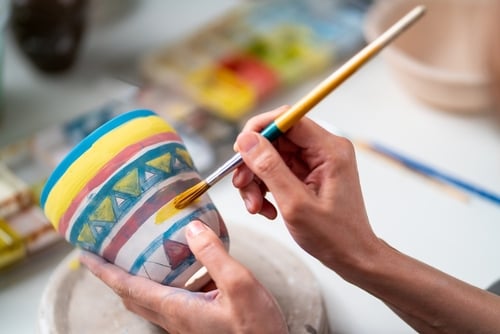
Here are some excellent examples of hobbies that can be added to a CV:
- If you're applying for a job in art: Painting -Sculpting -Drawing -Music -Writing
- If you're applying for a job in marketing: Singing -Acting -Dancing -Journalism
- If you're using it for a career in law: Riding horseback (or another kind) -Playing handbells (or another instrument)
The advantages of incorporating your hobbies on your CV are as follows:
- They convey who you are as a human.
- Extracurricular activities show the recruiter that you are a well-rounded individual who likes having fun and working.
- They set a pace for a more friendly conversation during the interview.
- Sporting activities demonstrate that you are physically strong, healthy, and outgoing.
- Volunteering shows your strong interpersonal skills.
Read Also: 10 Hobbies you can Turn into Business
Who Should Include His Hobbies & Interests in His CV?
- High-school graduates
- College students
- Fresh graduates
- Applicants who don't have the enough experience
Who Should Not Include His Hobbies & Interests in His CV?
- Professionals with managerial titles
- Seasoned Professionals
- Professionals with CVs that exceed the 2 pages.
What Are Some Examples of Interests that Can Be Added to the CV?

While some people may be well versed in the interests listed here, others are probably wondering how to describe their hobbies, favorite books, and other random things they're into. Here are some examples of different types of personal interests that can be added to a resume:
- Community event organization
- Participating in charitable activities
- Volunteering with local businesses, groups, and organizations
- Contributing to fundraising activities
- Campaign participation
- Participating in social, economic, or human rights organizations
Should I Add Hobbies and Interests to My CV?
The short answer is: it depends.In some cases, describing or listing various outside interests can help you stand out from the crowd of applicants.
For example, if you have unique hobbies or interests + an excellent reason to have them (for example, you're learning Spanish because the job you're applying for has a lot of business with Spain), that's a reason to include those hobbies in your CV.
It will show your potential employer that you already do things related to their company or industry.
In other cases, including hobbies can be unnecessary or even distracting.
If none of your hobbies are relevant to the job, then they're irrelevant material that will distract the person reviewing your CV.
The same goes for listing random things that don't matter to the reader (like how many hours per week you spend watching TV).
For most people, it's probably best not to bother with hobbies unless they involve anything related to the position they're applying for.
In general, unless something very unusual about your hobby is directly relevant to the job description, save hobbies for casual conversations and let your CV focus on what matters most during this stage.
What Do Your Hobbies "Say" About You?
Whenever you add a new hobby to your curriculum vitae, you're helping to create a clear picture of who you are.A little bird might not be able to tell if you're a dog person or a cat person by reading that you enjoy hiking and knitting, but I'm betting that it would have no problem picking up on the fact that you're an animal lover (a good quality in many contexts).
Even if you don't immediately think to connect your hobbies to your personality or professional goals, they're saying something about you.
It's worth noting that sometimes the things we do outside work say more about us than our job duties.
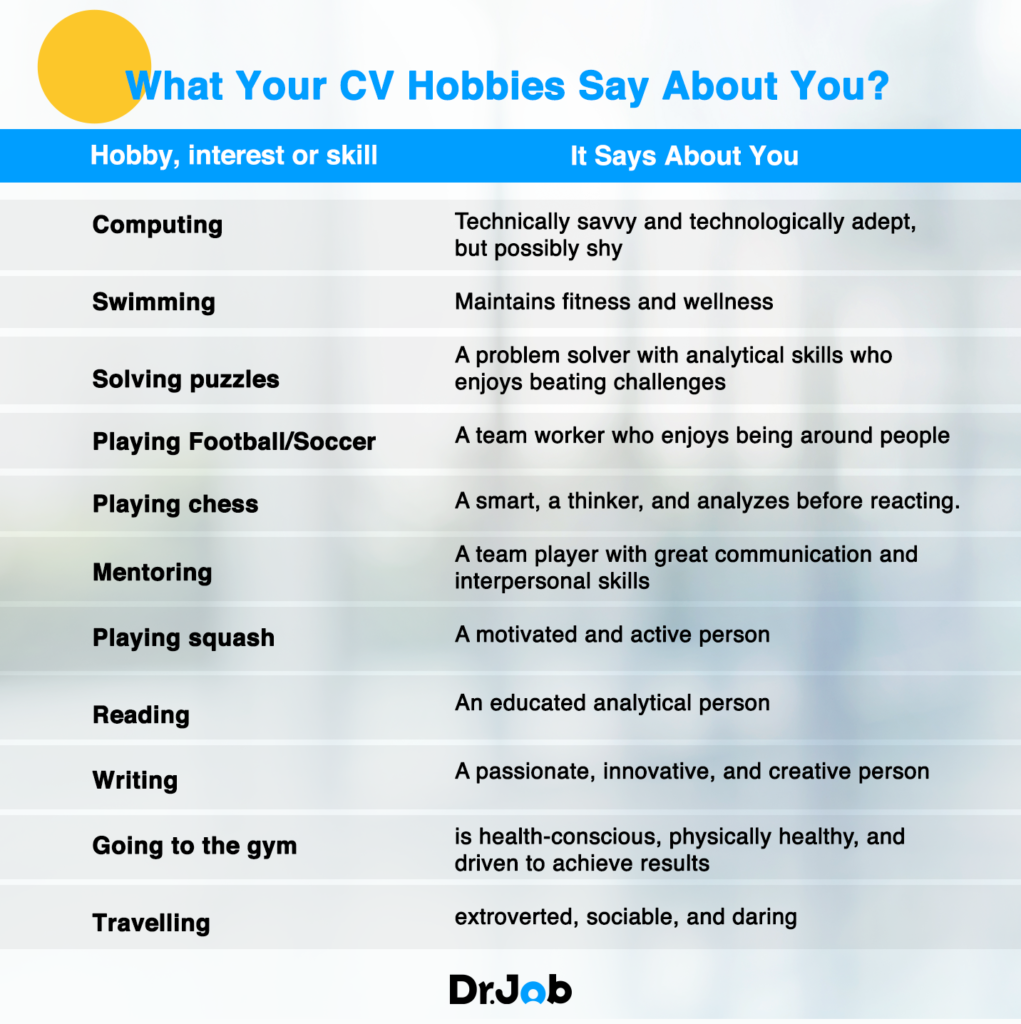
What Kind of Hobbies Should I Put on My CV?
You should be careful about how you describe your hobbies.Hobbies that say a lot about you:
If the hobby is something that involves skill or interest that is relevant to the job, then it's great. For example, playing the flute might show your musicality and attention to detail.
Or, if you are into sailing, it might demonstrate your organization and leadership qualities.
Hobbies that say nothing about you:
If your hobby doesn't relate directly to anything in the job description, don't put it on your CV. For example, if you're applying for a marketing job and have no interest in sports or games, there's no point mentioning them on your CV - they take up space and make it look like you haven't thought through what makes you unique and applicant.
Brain hobbies (such as chess) are an excellent fit for specialized or cognitive employment (e.g., jobs in AI).
Team sports (such as football) are an excellent fit for careers that need regular interaction with others (e.g., jobs in CSR or Business Management).
You must assess the situation since the same hobby can be perceived differently depending on your application position.
A video gamer, for example, will be considered an introvert while applying for jobs in marketing. Still, he will be the perfect fit for games developer or graphic designer positions.
How to Match Your Interests with the Job You are Applying For?
Finding a balance between being honest and not overdoing it is essential.You can use the same interests in your CV as those on your LinkedIn profile, but don't feel you need to include every single one.
Personal interests are essential when applying for a job that requires you to work closely with others. If the role requires collaboration or teamwork, it's better to show off your interests than leave them out altogether!
If there's something more specific you want to highlight, such as coding or photography, make sure that it's relevant to the position – otherwise, it's probably best left out.
Here are some tips on how to do this:
Research the Company
Understanding the company's culture will be your key to unlocking their interests. You have to read the job description carefully, check the company's website and online accounts, and view the company's employees' accounts on LinkedIn.
This will significantly help you pick the hobbies and interests that will get you the job.
If the company pays attention to its employee's digital presence, this show how strong is your online accounts due to your marketing efforts as a hobby.
List various hobbies and interests
It's generally a good idea to have some variety in your hobbies and interests.
Because hardly everyone is reading inclined, saying that you like reading books, discovering new information, and buying books confines you to a specialized group.
However, by describing a wide range of hobbies and activities, you may connect with a broader range of individuals – your CV is reviewed by many people, so give everyone what he wants.
Concentrate on your transferrable abilities.
Consider the precise transferable abilities and personal attributes they display and how they might be transferred to the work when deciding which hobbies and interests to describe.
If you're looking for a customer-service position, for example, you'll want to demonstrate your trust and communication skills — and interests like singing may help you do that.
Similarly, sports-related interests are ideal for showing your collaboration ability.
Use relevant examples from your experience
If you have been involved in any activities, you should include them on your CV - but only if they are relevant to the job you are applying for.
For example, if you have work experience in a shop and want to work in retail, then mention this in your application. If it is not relevant, don't waste space on it.
Use keywords from the job description
Look at the keywords used if you cannot see anything related to your hobbies or interests in the job description.
These are usually words like 'communication,' 'teamwork,' or 'problem-solving.'
If one keyword seems more appropriate than others, use it as an example of how well-suited you are for the role.
Make an effort to be remembered
Be courageous enough to list your unique hobbies, like collecting Macdonald's toys and connecting them to your next job.
This can help you stand out from applicants who have selected more specific interests by demonstrating your uniqueness to companies.
What Are Some Good Hobbies to Put on a CV? [Examples]
Unfortunately, not all pursuits are created equal. Some hobbies look good on a CV, while others can make you seem unprofessional.Here are a few guidelines to consider when including hobbies or interests on your resume:
- Add a separate section for "Hobbies" or "Interests."
- List your hobbies in 5 bullet points max
- Add it by the end of your CV
- Specify your hobby. Instead of saying "Puzzle," mention "A Suduko Expert."
Here are some examples of hobbies that will let you win the job:
VolunteeringWe're starting with volunteering: 82% of managers prefer to recruit someone with volunteering activities. Volunteering demonstrates initiative and personal integrity. It develops management and leadership skills as well.
Writing
Every organization's core is communications. Writing books or producing journal studies demonstrate your writing language skills.
Blogging
Communication and writing skills are your gateway to gaining great opportunities, so listing that you have blogging hobbies will be an added value.
Podcasting
The podcast content type is on the rise. Podcasting allows you to demonstrate your industry expertise, build an audience (marketing skills), and connect with experts. It's an excellent way to improve organizational skills, too.
Marketing
Marketing skills are a trend since social media is in everyone's interest. It will help if you have a professional LinkedIn account with many followers if you want to join big corporates, for example.
Languages
Being fluent in English hasn't become a sought-after skill. Employers now look for professionals who master widely used languages in the business world, including French, Chinese, and Russian.
So, being familiar with 3+ languages will impress the recruiters.
Reading
This is an excellent hobby because it shows that you're interested in what's happening in the world around you, whether politics, science, or even popular culture. The more books and articles you read, the more knowledgeable and excited you'll seem when talking about them in an interview or during an interview! You can also do this by joining a book club or reading online forums about topics that interest you.
Photography
It's not only about taking photos, but also it is about utilizing your artistic view and your technical skills
Travel
Loving traveling is essential to showcase your flexibility and adaptability skills since you prove that you can quickly adapt to new places, people, and cultures since you dare to get out of your comfort zone and try new things.
Sports
Sports show you have strong interpersonal skills as an extrovert willing to connect with more people daily.
Yoga
Yoga is a sort of entertainment, but it encompasses much more than relaxing. It also requires you to focus on your inhalation and is an excellent method to unwind. Furthermore, statistics suggest that comfortable individual is less likely to abandon their employment.
Dancing
Dancing isn't simply for enjoyment. It's a social experience that educates people on how to work together. It also improves mental function and aids in relaxation.
Hobbies that Shouldn't be Mentioned in Your CV
Hobbies and interests that demonstrate good characteristics or abilities, such as devotion and teamwork, will have a more significant influence. Before listing any activity or interest, consider whether the company will see it positively or adversely. Including:
- Introvert hobbies
- Violent hobbies
- Deviant behavior hobbies
- Funny hobbies that the recruiter may misunderstand
- Hobbies that convey your political views
How to Add the Hobbies and Interests to Your CV?
- Concentrate on what makes it unique.
- Don't feel it necessary to be very inventive.
- Include a separate section under "Hobbies" or "Hobbies & Interests."
- Enter up to five personal interests.
- Nothing generic should be listed.
Great Hobbies examples from Dr. Job's CVs!
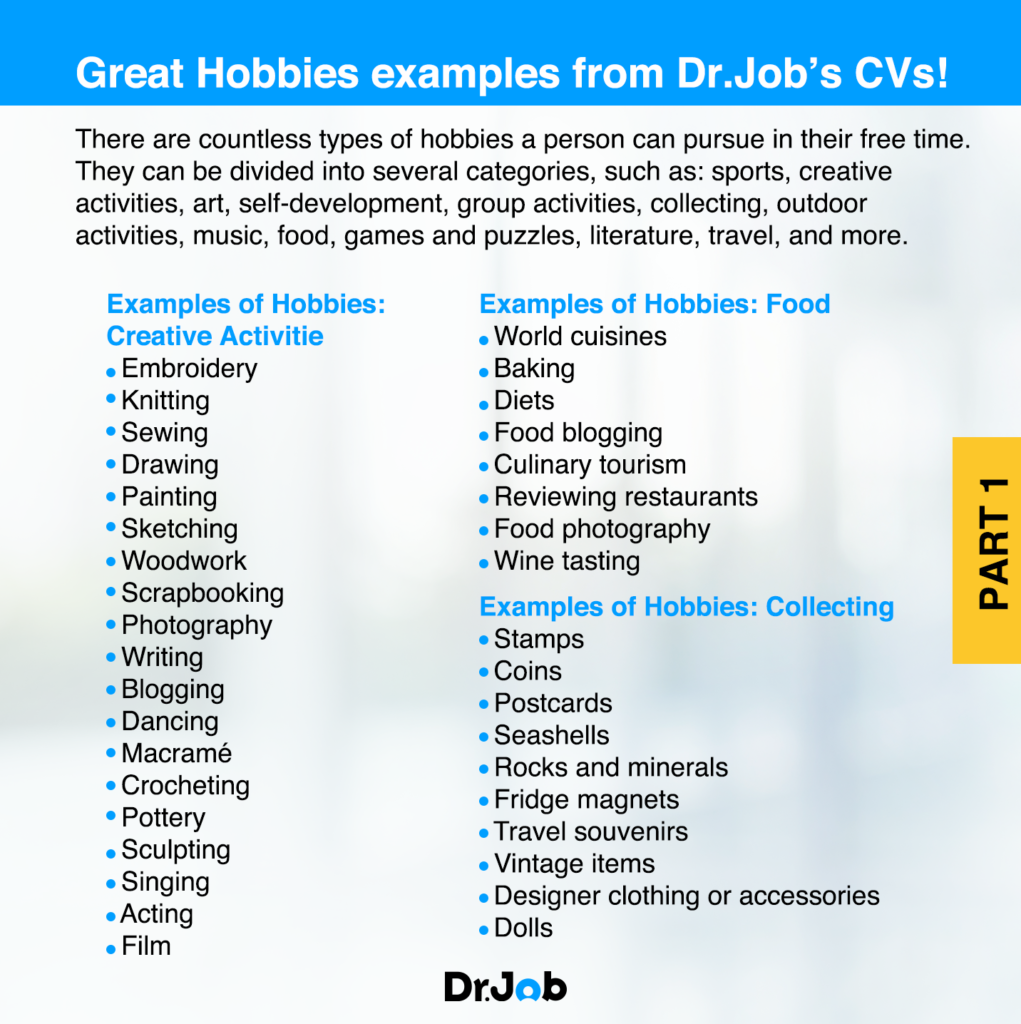
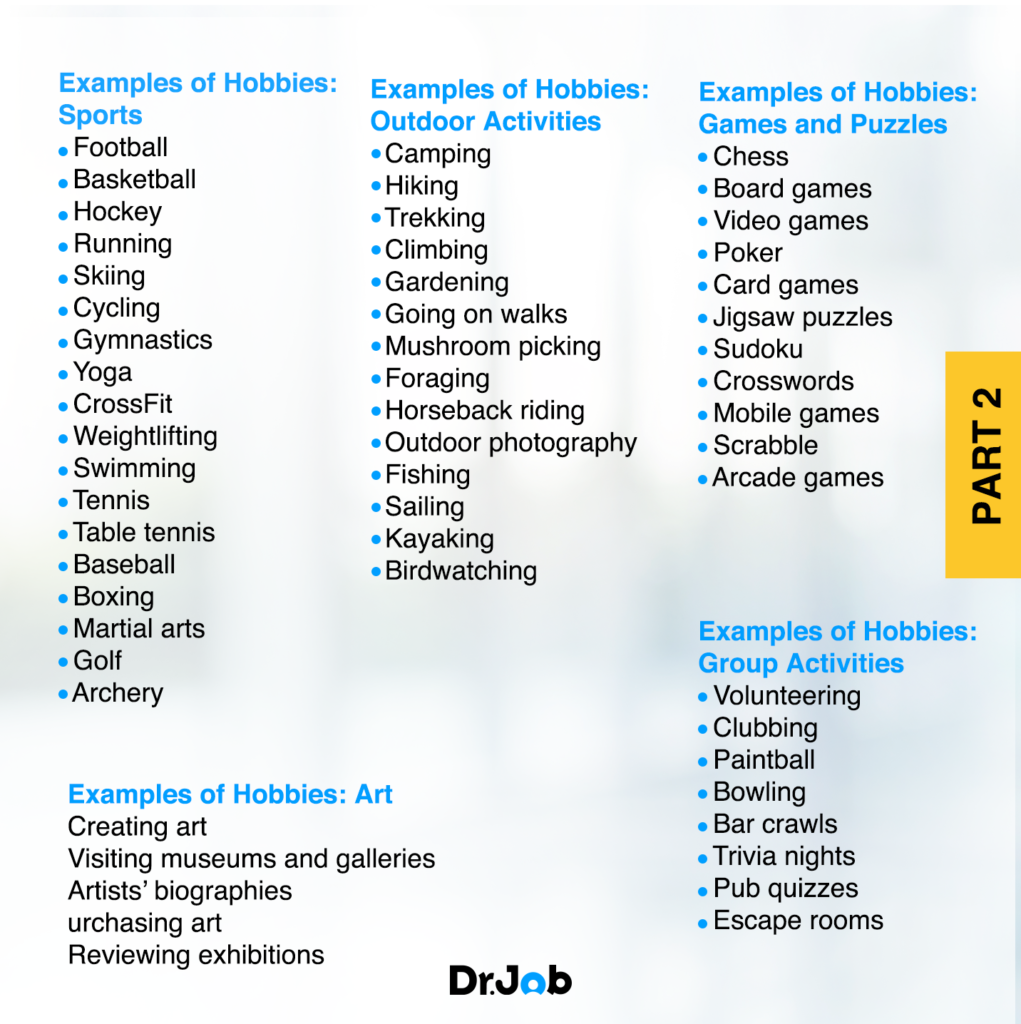
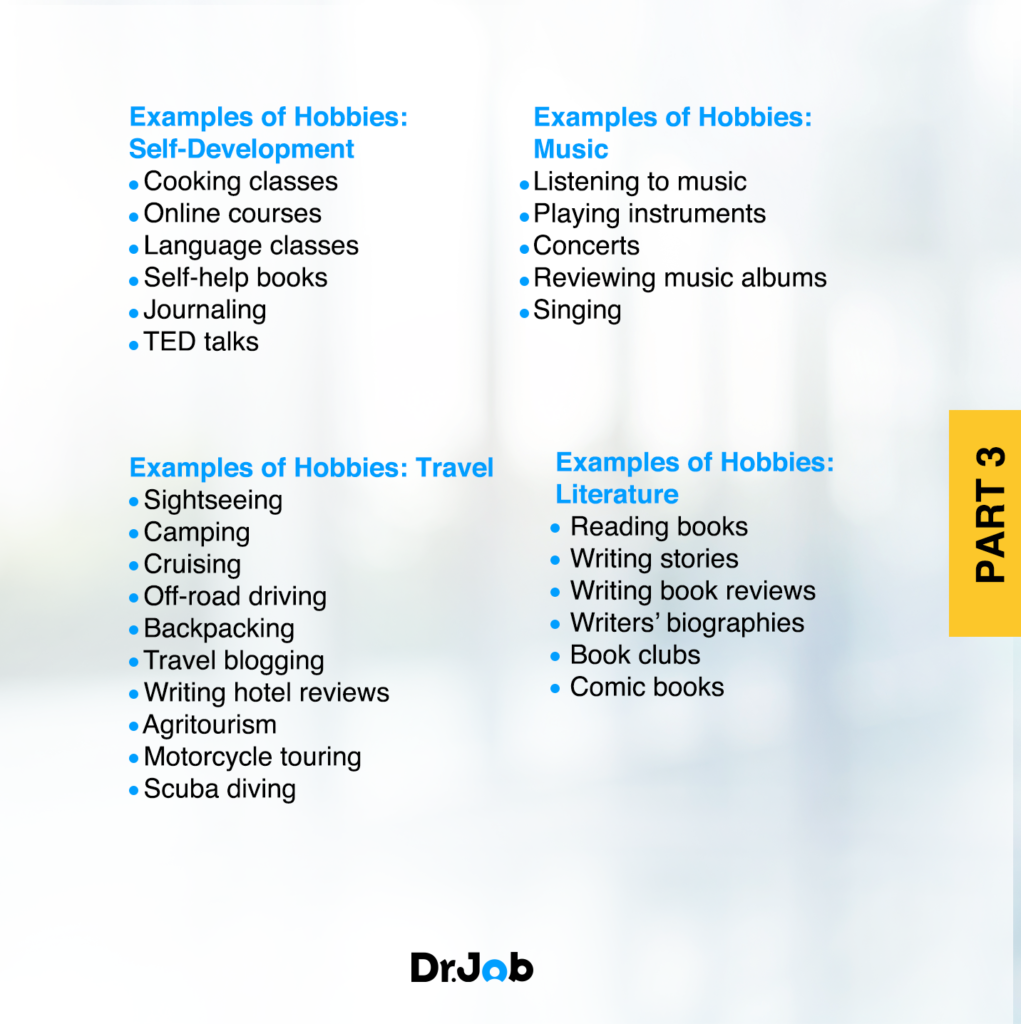
Where to Add your Hobbies and Interests Section in Your CV?
It should be at the bottom of the second page, right before the CV references section:
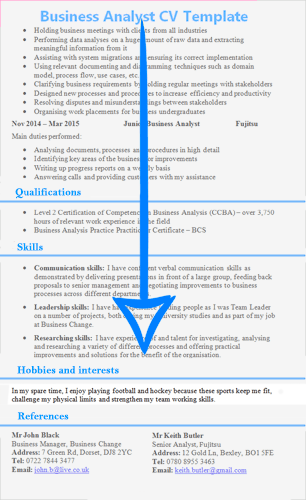








 2023-03-22
2023-03-22
 2022-10-11
2022-10-11
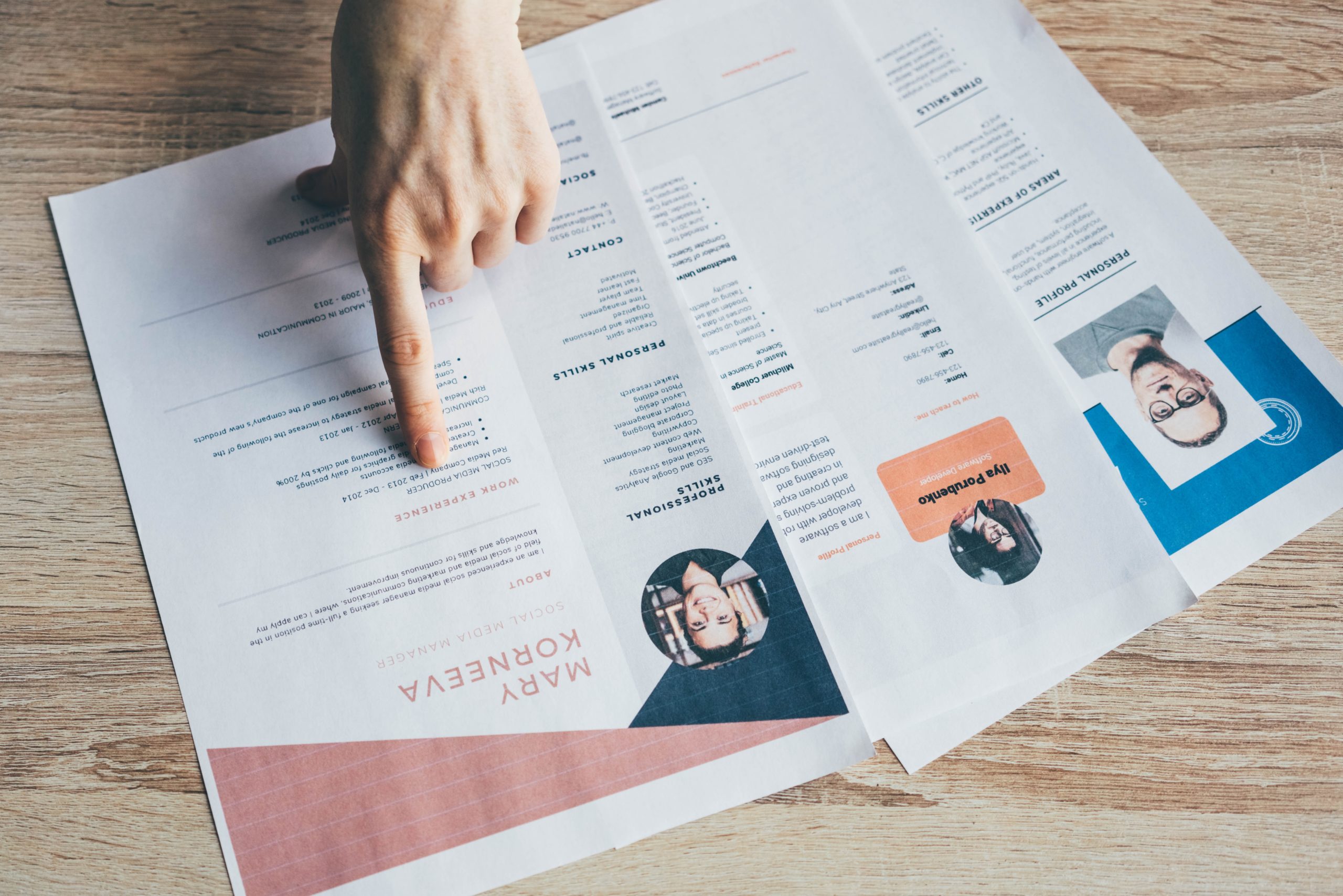 2022-09-14
2022-09-14
 2022-09-11
2022-09-11
 2022-07-15
2022-07-15